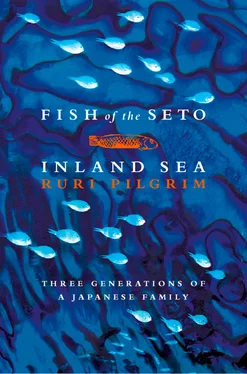She had never thought she would be a politicianâs wife, but she would do her best. Kei suspected that there was another reason for Tei-ichiâs decision to direct his efforts in a different direction. Whenever Yasuharu came home, there were villagers who came in with sheepish grins and asked, âEh, I wonder if the young Dr Yasuharu is at home?â Tei-ichi would say with a wry smile, âCunning rascals. Drinking bath water and wanting a new doctor.â Although Keiâs interpretation was simpler, Tei-ichi felt that the time had come for a new generation of doctors with knowledge and technology. Experience alone was no longer enough to gain peopleâs confidence. He had suspected this for a long time, perhaps since Shintaro came home from university.
Kei calculated that with his reputation and the respect he had among people, he would succeed in being elected. As though she had planned it all along, she said, âIt is very good timing.â
Their second son had been adopted by a landownerâs family in a nearby village. Their third son, Masakazu, Kei said, would not need any more education.
âWhy?â Tei-ichi wondered why she was telling him about their sons and also why there would be no more expense for Masakazuâs education. Their third son had always been a worry for Tei-ichi. Shobei had said that the Shirai boys were all bright but he had overlooked Masakazu. He was a kind, cheerful boy but would not be able to go to university without great expense for special tutoring, and even that might not achieve the aim.
Kei argued, âAny more education for him would be a waste of money.â
Tei-ichi had always thought of Masakazu as a failure. Many times he had sat with the boy till late at night trying to teach him things he could not grasp. The more annoyed and angry Tei-ichi became, the more confused the boy became until he could not answer questions that even Haruko was able to get right. But Tei-ichi was nevertheless determined to go on trying harder to make him like his other sons.
âHe is not good at school, but that does not mean he is not worthy,â Kei was saying. âHe is kind and honest. The post master in town promised to employ him if you agree. He can work from this spring when he finishes school. He will be able to have a contented and respectable life.â
Although Kei did not name him, Rinji was in her mind.
As for Hideto, Kei said, he was a bright boy. If it was difficult to send him to university, he could go to military college or naval college. They were free.
âIt does not matter if we have to sell our land now,â she went on. âKitani village is too small for our children. They should go out, and get their places in the wider world. Your ancestors would be proud of you if you spend what they passed on to you for the sake of the people around here.â
âOho!â Tei-ichi stared at his wife. If Haruko had been present, she would have understood that Yasuharuâs ambition had inspired Kei. âYou have grown to be a great woman.â Tei-ichi disguised his surprise by teasing.
âOh, no,â Kei replied modestly. âI am just repeating something Yasuharu san told me the other day.â
Tei-ichi Shiraiâs campaign had hardly any opposition, particularly after Shobei offered his wholehearted support. Shobeiâs trust in the Shirais as a mainstay for his family, expressed before his sonâs marriage, had been fulfilled.
Tei-ichi was busier and within a few years had risen to the position of Chairman of the Assembly.
In the spring, Masakazu started to work at the post office. Kei bought him the first bicycle in the village. On the morning of his first day, she lit new candles in the recess where the ancestral name tablets were placed. She made Masakazu sit by her and both of them prayed.
âI thanked our ancestors that you have grown up to be a fine man,â she said. âI am sure they are very proud of you.â She handed him his lunch box. She stood at the gate and watched him ride away until he waved at her and turned a corner.
The villagers were getting used to hearing the bell of the bicycle through the early morning mist, and a cheerful âGood morning.â âKuma san, if you want to write to your son again, Iâll do it for you. Come to the post office.â âThank you very much, Masakazu dansama. Iâll come to see you tomorrow, if itâs all right with you.â Watching his disappearing back, they would say, âThe young dansama of the Shirais are all hard-working and well educated.â Keiâs plan was successful.
âIt is better to be a chickenâs head than an oxâs tail.â Kei was breezy when talking to Ayako about her younger brother. âHe is respected now and appreciated. He would have been miserable among scholars.â
âWhat does that mean, obahsama?â Haruko asked, laughing. âWhy is he a chickenâs head?â
Kei was serious. âIt means, it is much better to know oneâs place than to hang at the bottom of more able people and be undistinguished. Remember it. It is an important lesson in life.â
As for Hideto, Kei was confident and hardly worried about her youngest son. He was now a boarder at a school in town. Although he was mischievous, he was popular among his friends. Kei secretly believed that he had the potential to become a great man. He would be a hero among heroes, she thought. The school tolerated most of his adventures and he was given only minor punishments.
It was mere boyish misbehaviour. On winter evenings, when the boys were hungry, the vendors came around calling, âBaked sweet potatoes! Baked sweet potatoes!â, or, âBuckwheat noodles. Hot noodles!â, over the school walls. The vendors had earthen barrels with burning charcoal on a cart, and the sweet potatoes were hooked and baked inside. It was always Hideto who had to go and buy them for everyone, as he was the best able to climb up on the high wall of the boarding house.
One night, as Hideto carried a hot newspaper bag and jumped down into the school premises, a teacher was waiting for him. He was also involved in many fights, mostly defending weak boys from bullies. All the incidents were duly reported to his parents and they both ignored them.
âHe has already been punished at school,â Tei-ichi would say. âLeave him. If he is still like that when he is eighteen, then, I will disown him.â Kei secretly loved these stories which she thought gallant and fun. But when he participated in a strike against the school authorities, the matter could not be left unattended. It was an incident concerning a young history teacher. He was enthusiastic about democracy and freedom and excited the boys with an idealism bordering on anti-imperialism and anti-militarism.
This was at a time when twelve people had been sentenced to death just for being accused of planning the assassination of the Emperor. Socialism was a dangerous word. The Military Police were increasing their influence. Although Hideto was not a senior pupil or the main agitator, taking part in the strike was judged to be a grave offence. Tei-ichi was not only Chairman of the Assembly but also by then the head of the parentsâ association of the school. The school hesitated to publicise his sonâs misconduct. If it was known that Hideto was treated generously because he was Dr Shiraiâs son, Tei-ichiâs name would be tarnished. On the other hand, if Hideto was either suspended or expelled from school, it would affect his future.
Kei visited the headmaster, the deputy headmaster, the class teacher, and all the other teachers, even the kendo instructor, and apologised to each one. She was the wife of the Chairman of the Prefectural Assembly and a doctor who was widely known and respected. Her family was also closely connected with the Miwas, but she humbly and politely asked everybody to forgive him as in future he would be strictly supervised. All the teachers sympathised with Kei. She was admired as âa very accomplished ladyâ.
Читать дальше












